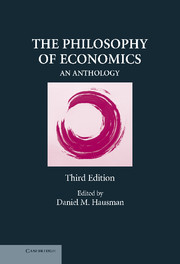Book contents
- Frontmatter
- Contents
- Introduction
- PART ONE CLASSIC DISCUSSIONS
- PART TWO POSITIVIST AND POPPERIAN VIEWS
- PART THREE IDEOLOGY AND NORMATIVE ECONOMICS
- PART FOUR BRANCHES AND SCHOOLS OF ECONOMICS AND THEIR METHODOLOGICAL PROBLEMS
- 16 Econometrics as Observation: The Lucas Critique and the Nature of Econometric Inference
- 17 Does Macroeconomics Need Microfoundations?
- 18 Economics in the Laboratory
- 19 Neuroeconomics: Using Neuroscience to Make Economic Predictions
- 20 The Market as a Creative Process
- 21 What Is the Essence of Institutional Economics?
- PART FIVE NEW DIRECTIONS IN ECONOMIC METHODOLOGY
- Selected Bibliography of Books on Economic Methodology
- Index
- References
20 - The Market as a Creative Process
Published online by Cambridge University Press: 05 June 2012
- Frontmatter
- Contents
- Introduction
- PART ONE CLASSIC DISCUSSIONS
- PART TWO POSITIVIST AND POPPERIAN VIEWS
- PART THREE IDEOLOGY AND NORMATIVE ECONOMICS
- PART FOUR BRANCHES AND SCHOOLS OF ECONOMICS AND THEIR METHODOLOGICAL PROBLEMS
- 16 Econometrics as Observation: The Lucas Critique and the Nature of Econometric Inference
- 17 Does Macroeconomics Need Microfoundations?
- 18 Economics in the Laboratory
- 19 Neuroeconomics: Using Neuroscience to Make Economic Predictions
- 20 The Market as a Creative Process
- 21 What Is the Essence of Institutional Economics?
- PART FIVE NEW DIRECTIONS IN ECONOMIC METHODOLOGY
- Selected Bibliography of Books on Economic Methodology
- Index
- References
Summary
James M. Buchanan (1919–) is Advisory General Director of the Center for the Study of Public Choice and Harris University Professor at George Mason University. He received his Ph.D. from the University of Chicago, and he is best known for his work in political economy. He was awarded the Nobel Prize for Economics in 1986 in recognition of his work analyzing economic and political decision making.
Viktor J. Vanberg (1943–) is Professor of Economics at George Mason University and coeditor of the journal Constitutional Political Economy. He received doctorates from the Technische Universität in Berlin and the University of Mannheim. His research focuses on the economics of institutions and on political economy.
Had Pyrrhus not fallen by a beldam's hand in Argos or Julius Caesar not been knifed to death? They are not to be thought away. Time has branded them and fettered they are lodged in the room of the infinite possibilities they have ousted. But can those have been possible, seeing that they never were? Or, was that only possible which came to pass?
James JoyceIntroduction
Contributions in modern theoretical physics and chemistry on the behavior of nonlinear systems, exemplified by Ilya Prigogine's work on the thermodynamics of open systems (Prigogine and Stengers, 1984), attract growing attention in economics (Anderson, Arrow, and Pines, 1988; Arthur, 1990; Baumol and Benhabib, 1989; Mirowski, 1990; Radzicki, 1990). Our purpose here is to relate the new orientation in the natural sciences to a particular nonorthodox strand of thought within economics.
- Type
- Chapter
- Information
- The Philosophy of EconomicsAn Anthology, pp. 378 - 398Publisher: Cambridge University PressPrint publication year: 2007
References
- 5
- Cited by



